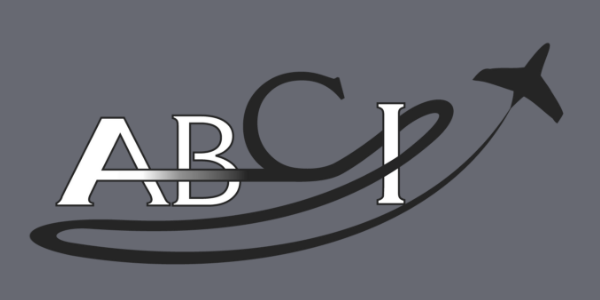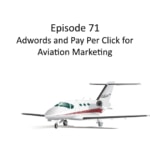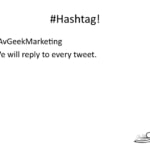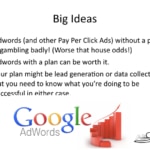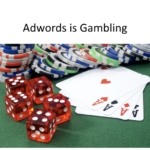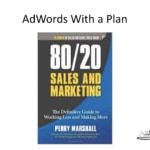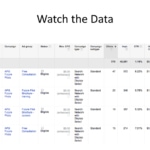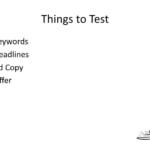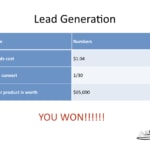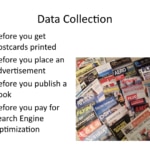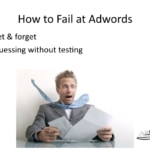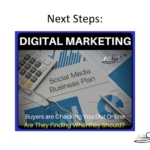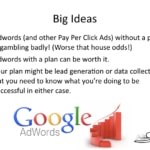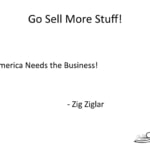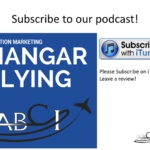Aviation Adwords – Pay Per Click for Lead Gen & Data Collection
“Guaranteed first page placement on the search engines” is what the salespeople say about Google Adwords and Pay Per Click advertising. And they’re right, you do get that.
John and I talk about the “gambling addict” attraction, the “sugar high” traps, and the pros and cons of Adwords, including two ways to use it correctly.
Transcript – Aviation Adwords – Pay Per Click for Lead Gen & Data Collection
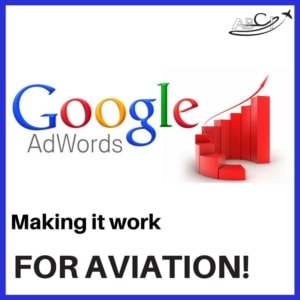 Paula Williams: Welcome to aviation marketing hangar flying episode number 71, AdWords and pay per click for aviation marketing. So, I’m Paula Williams
Paula Williams: Welcome to aviation marketing hangar flying episode number 71, AdWords and pay per click for aviation marketing. So, I’m Paula Williams
John Williams: I’m John Williams.
Paula Williams: And we are ABCI. And ABCI’s mission is
John Williams: To help all you folks out there in the aviation world sell more products and services.
Paula Williams: Absolutely, so if you want to reply to this or discuss any of these topics you can use our blog for comments and things like that. Or you can use the hashtag #AvGreekMarketing, A-V Greek Marketing. And we will replay to every tweet and make sure you get you answers to your questions.
And hopefully, we love to hear what you have in mind because everybody has different ideas and especially about new technology. There’s always stuff that we don’t know so make sure you let us know right?
John Williams: No stuff we don’t know you’ve got to be kidding.
Paula Williams: [LAUGH] It could happen.
It’s moving so fast right? In fact this is where I hesitate to do topics like this because we know it’s going to be out of date like. A week after we recorded but we think there’s enough going on that it’s worth talking about, right?
John Williams: Yeah. This kind of stuff.
Google changes stuff daily and the big stuff, they change monthly or quarterly, so.
Paula Williams: Exactly, so but the big ideas are actually pretty similar. And the big ideas I think are useful no matter when you’re listening to this. If this is this week or a week from now or three weeks from now or three months from now.
AdWords, and other pay per click, without a plan is gambling and gambling badly right?
John Williams: Yeah and you don’t even get house odds. They do.
Paula Williams: Mm-hm absolutely. But AdWords with a plan can be worth it depending on the circumstance.
John Williams: Yes it can.
Paula Williams: Right.
John Williams: With a good plan.
Paula Williams: Yeah [LAUGH] and we’ll talk about some of the differences between a good plan and a bad plan.
John Williams: A good meaning one that’s well thought through.
Paula Williams: And no plan, which is what most people do.
John Williams: Yep.
Paula Williams: Right, okay, and then the other thing is your plan might actually be lead generation, or the objective of your plan might be lead generation or it might be data collection.
But in either case you need to know what you’re doing, right?
John Williams: And we can help you figure that out.
Paula Williams: Exactly, okay, so let’s start out with what can possibly go wrong. [LAUGH]
John Williams: [LAUGH] Well what can possibly go wrong in a poker game?
Paula Williams: Right.
John Williams: And those are the house’s cards there, not yours.
[LAUGH]Paula Williams: Exactly, so AdWords is gambling. Even if you’re doing it right, you’re still gambling. You’re just improving your odds. So of the people that see your ads, are they the right people. And of the people that see your ads-
John Williams: That are the right people-
Paula Williams: That are the right people, how many of them are clicking on your ads?
And of the people that see your ads are the right people, click on your ads and go to your website. How many of them take the next step with you? Which would be to fill out some kind of a form or give you their contact information. So that you can proceed with the sales process.
John Williams: Versus how many of them just bounce out.
Paula Williams: Right. So if you’re doing lead collection [LAUGH] it’s gambling, each of those steps. There’s going to be some people that are not the right folks. There’s going to be some people that dont’ click on your ads. There’s going to be some people that click on your ads and don’t fill out the form.
There’s going to be some 14 year olds who are completely unqualified for your product or service that fill out the form. That’s the naturel
John Williams: Of the beast.
Paula Williams: Of the beast. Right. And you’re paying for all those things, so [LAUGH]
John Williams: Yes, you are.
Paula Williams: Right, whether they work or not, some percentage is going to be useful to you, and some percentage is not.
And that’s why we call it gambling.
 Paula Williams: But basically what we’re doing is we’re improving our odds. And we actually used the book, Perry Marshall’s 80/20 Sales and Marketing book last year when we talked about AdWords. Perry Marshall being somebody that’s been in AdWords for a really long time, for business to business companies.
Paula Williams: But basically what we’re doing is we’re improving our odds. And we actually used the book, Perry Marshall’s 80/20 Sales and Marketing book last year when we talked about AdWords. Perry Marshall being somebody that’s been in AdWords for a really long time, for business to business companies.
And in the book, they actually have a pretty good Plan for testing with AdWords and for getting started with AdWords and I think that’s still a really a good place to start. A lot of people that it is dated, and it is,but I think it’s a much better place to start than simply winging it with AdWords.
John Williams: Yes.
Paula Williams: Right. So it’s one of those things that if you’re going to be playing this game, you really need to spend the time to get good at it.
John Williams: Know the rules and play it well.
Paula Williams: Right, exactly. And the other thing that you really want to do is you want to watch the data.
So, I have on my iPad the AdWords app. So I’m watching the ads for us and for our clients, pretty much every day pretty obsessively. It’s almost like day trading right? [LAUGH] Or online gambling.
John Williams: Actually that’s probably a pretty close approximation.
Paula Williams: Right it is kind of an addiction and if you have an addictive personality this might work for you but you really want to watch your numbers and if you find.
That things are changing or if you find that things are not going your way, some of the things that we look at when we look at our data are which of our ads are performing the best? Which of our ads are performing the worst? And if you’re seeing this in video, I’ve got some data on the screen from one of our client contracts.
With their permission of course and you can see that we’re paying anywhere for a $1.04 to $0.91 per click for these particular ads and these particular ad groups. And then I can go into more detail and see which keywords are getting us the best and the worst conversion.
Which headlines are getting us the best and the worst conversion, and so on. And you want to be always eliminating the ones that are costing you the most. So that dollar four, we used to have some that were in the $3 range in this In this campaign, we got rid of them because they weren’t performing as well as our others.
So we get rid of them, we replace them with ones that do work better. And we’re always testing to see if we can make that better.
John Williams: And actually I thought that those were astronomical prices for pay per click. However, we have a client a previous client or two that we know about who are spending $3500 to $4000, $4500 a month in ads rather than doing marketing and they are not doing so well.
Paula Williams: Right. It is not hard, especially with some of the really competitive keywords to pay $12, $13 a click. And if you’re ratios are good enough, again, this is a lot like going to Las Vegas [LAUGH].
John Williams: Well and you have to look because I’ve seen in our research for what the clicks cost on some keywords, I don’t remember what it was, but $468 a click?
Paula Williams: Yeah, those are for some of the really competitive keywords. And I’d recommend staying away from those. This is just like when you go to Las Vegas for the first time, you want to play the nickel tables to start with, right? So you want to find some key words that aren’t quite so competitive until you learn to play the game.
And watch your numbers. See if you can improve your headlines, improve your ads, and improve your quality scores until you can improve those ratios. And make sure that you can sell enough to cover your bills right?
John Williams: Seemed like a long time gamble. They don’t have nickel tables.
That’d be the $5 tables [LAUGH].
Paula Williams: Okay fine [LAUGH] but still you want to start with the low risk bets.
John Williams: Yeah.
Paula Williams: You don’t want to go sit down your first time in Vegas at the high stakes tables where they bring you cocktails and have the rarified air and the billionaires.
You don’t want to be plunking down millions of dollars your first shot at AdWords. You want to play the nickel tables for a while or the $5 tables, whatever you want to call them. In this case, we’re playing the dollar tables, right? And we get better at it, and we get to the point where we know how many sales we can make for each click.
So if it takes us, well we’ll get into the details of that in just a minute in the math. But if math isn’t your thing, this is not where you want to play, right? And if being detail oriented and being on top of the data is not where you want to be, then if that’s not your thing, this is not the game for you.
John Williams: No, not at all.
Paula Williams: Right, okay. So things that you can test when you’re doing AdWords. You want to have three or four of each of these things that you’re testing pretty much all the time. So you want to eliminate the worst one and replace it with a better one every single time.
So there’s three or four that you’re testing at any given time, so you may have three or four different versions of the same ad with different keywords. Three or four versions of the same ad with different headlines. Three or four versions of the same ad with different ad copy and three or four versions of the same ad with a different offer.
And you can use the plan in the AD 20 book to kind of do the math so that you’re doing this sequentially. So test your key words first, headlines second, ad copy third, offer fourth right?
John Williams: Yep.
Paula Williams: Okay and then as things improve you’re spending less money for better odds.
John Williams: And if they don’t improve you know to go the other direction.
Paula Williams: Exactly, well, if you’re testing three or four and you’re eliminating the worst all the time and keeping the best they’re going to improve.
John Williams: That’s right unless something clicks that you don’t realize.
Paula Williams: Yeah sometimes you’re going to test something.
John Williams: You can get all the way to the end and change something and all of a sudden it goes to the bottom.
Paula Williams: Right and even if it’s something sometimes it’s not something that you changed but it’s something that changed in the market.
John Williams: Yep.
Paula Williams: And then all of a sudden your AdWords tank.
You need to be on top of that and see it the day that it happens instead of a month later after you’ve paid a lot of money and.
John Williams: Been there, done all that.
Paula Williams: Yeah. Okay, so this is kind of the math that we’re looking at when we’re doing AdWords.
So let’s say that our leads cost $1.04 which is kind of a high end of that campaign that I was showing you before. And let say that we can, we know we can convert 1 out of 30 of each of those leads into at least an appointment. And then of those leads, of course we may have another line here of, we know one in ten of the people that make appointments.
We can convert to a $65,000 sale. So we’re still money ahead, right? Okay, so you can say, you know a $14 click is outrageous, but if what you’re selling is a high ticket item and your close ratio is good enough, you can do that all day long right?
John Williams: Absolutely.
Paula Williams: Right. So what this means is you have to know the numbers. So you know if you’re winning or losing at any given time. Right?
John Williams: Yep.
Paula Williams: Okay, so and John you’re the math guy [LAUGH] What do you think of these odds?
John Williams: Well, once you’ve got it down to where you know what’s going on, the odds aren’t odds anymore.
Then we’re going to assign probabilities and if you want to play really interesting math games and let’s see if you can follow through on it.
Paula Williams: Absolutely. But you still want to be on top of it, because even once you know these numbers, it is still a moving target, because all of a sudden you might have a bunch of competitors jump in and raise the price of your bids.
You might have-
John Williams: Even if they don’t, you can bet your bottom dollar that Google’s going to change something.
Paula Williams: [LAUGH] Google’s going to change an algorithm and maybe change your quality score because of a new rule they come up with. There’s lots of things that can change that will change one or more of these numbers.
So it’s really important to know, what is your lead cost? What is your conversion rate and what is your profit from each conversion?
John Williams: And then after all that you need to have somebody or yourself to keep up the speed of what Google is putting out.
Paula Williams: Exactly that’s absolutely right.
Okay so that’s lead generation and the math on that is simple. I’m not going to say easy. Because math for me is not easy. [LAUGH] But it’s fairly simple once you get your numbers down then you have a feel for how you’re doing whether you’re winning or losing right?
John Williams: Yeah don’t believe her about not being easy for her. She got a better score on the SA or what was it? The GMAT than I did.
Paula Williams: Only after a lot of studying. You took it cold so. But still, we get where we need to get, doing what we need to do, right?
Okay, so another way that you can use AdWords, and it actually is really good for this, is if you’re going to spend some money on printing or on placing an advertisement, right? It is a great way to test keywords, headlines, ad copy, and all of those other things, cheaply.
So, let’s say you’re going to place an ad in a magazine in the ad contractors, thousands of dollars or tens of thousands of dollars. It’s worth spending 50 bucks or 100 bucks or something like that to run some tests in AdWords and see which headline performs better.
John Williams: Of course, that’s part of it, you really can’t do without it.
Paula Williams: So you follow the same process that we outlined before. You want to test your keywords first, your headlines second, your ad copy third, and your offer fourth. And once you get those all Improved as much as you think you can then you’re in a much better place to spend thousands of dollars or tens of thousands of dollars on your magazine ad right?
John Williams: Yes.
Paula Williams: Okay and that would be true of let’s say you’re going to get a bunch of brochures or post cards printed or you’re going to place an advertisement in a magazine or you’re going to publish a book. I don’t know if you remember Tim Ferriss, he wrote The 4-Hour Work Week.
The way he figured out the title for that is by testing a bunch of titles in Google AdWords. And he figured out what was going to be the best selling title. Because book titles are incredibly important, right?
John Williams: Yes.
Paula Williams: So, he tested a number of different titles and came up with the best one using Google AdWords before he decided on a title for his book and gave that to his publisher.
Paula Williams: And then the last thing is before you pay for search engine optimization. Because you can pay hundreds of dollars a month for search engine optimization.
Paula Williams: Our search engine optimization program is a couple hundred bucks, actually several hundred bucks a month. I think it starts at $979 a month.
So and it’s very much worth doing Search Engine Optimization before you do pay per click if you can. But if you just starting out, you may want to reverse that and spend $50, a $100 on some ad words and figure out what keywords you want to be optimizing for, right?
John Williams: Yep.
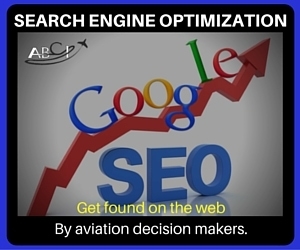 Paula Williams: So we actually include that in our Search Engine Optimization program, just to make sure that we’re getting the right keyword for you. We do our best guesses and then we run some ads to test those hypothesis before we devote a lot of energy to search engine optimization.
Paula Williams: So we actually include that in our Search Engine Optimization program, just to make sure that we’re getting the right keyword for you. We do our best guesses and then we run some ads to test those hypothesis before we devote a lot of energy to search engine optimization.
But it’s kind of like a cycle of you get your keywords right with pay per click and then you get your search engine optimization. And then your pay per click ads become much less expensive because you get a better quality score from Google. So, maybe I should take a minute and explain how that works.
Even the paid ads on Google, they don’t want to just serve any old ads because Google makes their money with people using their search engine. People are more likely to use their search engine if it’s serving high quality relevant ads. So they want to make sure that no matter how much you want to pay for an ad, you can’t buy an ad on a page that it’s not relevent for.
So they give you a quality score and say your site is of this quality and then they’ll charge you less for ads. They’ll give you a discounted rate based on the quality of your site. So the better your search engine optimization is, the less you’re going to pay for pay per click ads.
So a lot of people think I don’t need to do search engine optimization. I’m doing pay per click, right? Wrongo [LAUGH] search engine optimization will actually reduce the rates that you pay for pay per click by a whole lot, because they want to be serving really high quality sites, and the way that you have a high quality site is by doing search engine optimization and having great content on your site, right?
John Williams: Chicken and egg.
Paula Williams: Chicken and egg, absolutely. Okay, so let’s talk about how to fail at AdWords. Some of the things that can go wrong, right? Okay, so, one is the set and forget method. You know, the Ron Popeil and whatever that was called, the chicken and the kitchen appliance that you could just set it and forget it right?
John Williams: Yeah well you don’t do that here because it will cost you a bundle of money and you won’t get anything out of it.
Paula Williams: Exactly so setting and forgetting. Anybody that recommends that you just set up your AdWords and then you look at it once a month or something like that.
They’re out of their mind. You definitely want to make sure that you’re installing the AdWords app and watching that every day or make sure that the people who are doing this for you are watching this every day and letting you know if there’s anything happening that needs to be changed or different or anything like that.
Okay, the second way to fail at AdWords is by guessing without testing. So you think these are the keywords that you should be using, and you just set them up and Think that you’re in good shape.
John Williams: What does this mean you think they are?
Paula Williams: [LAUGH] Exactly.
John Williams: [LAUGH]
Paula Williams: Well you’re in the business of selling widgets. So you say-
John Williams: Yes, beside the point, if you just think what these people are going to use for keywords, this is with my whole, when we first started way back when, this was my whole, how do you know what they’re using for keywords?
How do you know what they’re going to use for keywords? How do you know what they’re going to search for? Because that’s, whatever they search for is what you want as a keyword.
Paula Williams: Absolutely. In fact, when we started our company, when we started ABCI we thought we were in the business of aviation copywriting.
As it turns out, nobody knew what aviation copywriting was, even John. He was not really understanding what that word meant. And a lot of people in aviation don’t really use that word as much as they do in the finance industry or the education industry. Or other places where sales copywriting is a thing, right?
John Williams: Mm-hm.
Paula Williams: So, if we had advertised for aviation copywriting, even though that was the most specific way of calling what we did at that time, it wouldn’t have gotten-
John Williams: Off the ground.
Paula Williams: Off the ground. So we ended up doing aviation marketing. And then as it turns out we also have to do very specific words like aviation AdWords, aviation hashtags, aviation tradeshows.
Other kinds of things that are a lot more specific. Because we know from testing that that’s what people are actually looking for, right?
John Williams: Yes.
Paula Williams: So what can happen if you do either of those things, is you can set up your AdWords with a $5 or $10 a day budget, or whatever budget you set up It seems like, this is no big deal, we can do $5 or $10 a day.
No problem, right?
John Williams: $10 a day is $300 a month, and you don’t get anything out of it. That’s throwing money away.
Paula Williams: Absolutely, or $25 a day, or whatever budget you set. It may not seem like much, but then when you get the bill at the end of the month, It can be kind of shocking [LAUGH] .
John gets the bill and says Paula what are we doing with AdWords with this company? So and if it’s working and if you are covering that with good odds.
John Williams: A sale every month then okay.
Paula Williams: Right, absolutely, or the amount of sales that you need in order to make that worth it.
Then that’s fantastic. And if you know that that takes x number of months from the time they see the ad to get through your sales process but you’ve followed the numbers all the way through, you’re still good.
John Williams: Yep.
Paula Williams: But if you’re not following the numbers, you can really be surprised and really do yourself some damage, right?
Okay. So, next steps. We’ve got two programs that We do, where we do AdWords for people. And one of them I already told you about, that’s our search engine optimization program where we actually do a little bit of testing, where we talked about AdWords for data collection. We do that a little bit at the beginning of our search engine optimization program And your search engine optimization program is basically we have a basic moderate and competitive rate.
So depending on what kind of a business you are, and what your competitors are doing, if you’re a flight school or something like that, then it’s a lot more competitive because all of those folks are in Google AdWords competing for the same keywords. But if you’re in a field where not very many people are using AdWords, then it’s going to be a lot less expensive for you to do search engine optimization.
And we can give you a quote on that if you’re interested. The other thing that we offer is what we call digital marketing. And what that includes is we set up company profiles on Facebook, Twitter, and LinkedIn and then we also do what we call retargeting. And we will also set up your Google AdWords for you.
And monitor that for you.
John Williams: Note that she said company profiles, not personal.
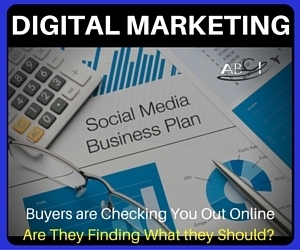 Paula Williams: Exactly. So it’s basically, our digital marketing program is visibility for you online. Using all of those things including retargeting, social media and AdWords. So what’s that about for you? We don’t pay the fees for the ads themselves, but we do our down list to get you the best rates that we can and we give you reports As often as you like.
Paula Williams: Exactly. So it’s basically, our digital marketing program is visibility for you online. Using all of those things including retargeting, social media and AdWords. So what’s that about for you? We don’t pay the fees for the ads themselves, but we do our down list to get you the best rates that we can and we give you reports As often as you like.
And we also help you set up your Google AdWords account so you can see how that’s going for you. And which words, which headlines, and which copy is doing the best for you. And we walk you through that whole process. Make sense?
John Williams: Precisely.
Paula Williams: Okay, so that’s actually a really good way to make this less risky.
If you’re getting into it for the first time is to go in with a guide and see how that works. So, big ideas for this month, once again, AdWords and other Pay Per Click programs without a plan is the same as gambling badly, right?
John Williams: Mm-hm.
Paula Williams: Okay.
AdWords with the plan can be very much worth it. Once again it’s quick, it’s effective. You can get people to an event or do something that requires you to advertise quickly. Things like that, you can start today, basically and have your ads out there by the end of the day.
It’s a probably the fastest form of advertising that I’ve ever seen. But your plan might be lead generation or data collection, but you need to know what you’re doing if you want to be successful in either case, right?
John Williams: Yep.
Paula Williams: Okay, so worth it, but have a plan.
Or have a guide, or both.
John Williams: Yeah, and follow. Plan and/or guide.
Paula Williams: Right, this does take some self discipline. It’s like gambling, like we said. If you have one of those addictive personalities or something like that, in fact one of our clients, I used to say that they really got into the sugar rush of AdWords.
And we had this conversation every month. They really liked seeing Those numbers go up on their Google Analytics and other kinds of things. But we had to talk them down from that every single month and say, okay now how many sales are we actually getting from this? Maybe we should redirect some of the money from Google AdWords into something else until we get this under control.
Because this is not sales, this is just numbers at this point. So until we follow the numbers all the way through it takes some discipline to do this right, right?
John Williams: Yes it does.
Paula Williams: Okay, so go sell more stuff.
John Williams: America needs the business.
Paula Williams: Right, that’s Zig Ziglar, I bet he said that best.
So subscribe to our podcast on iTunes, Stitcher, or Google Play. And please do leave us a review. And also please do leave us your comments. What experiences have you had, adventures or misadventures, on Google AdWords. We’d love to hear about it. Talk to you soon.
John Williams: Ciao.
} else {..
Podcast: Play in new window | Download
Subscribe: Spotify | Amazon Music | RSS
